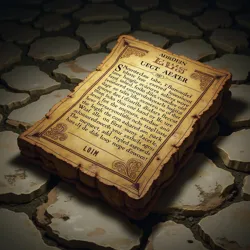Ancient Laws of Desire
 The original Tablet of Yearnings, discovered in the ruins of the First Wishing Well
The original Tablet of Yearnings, discovered in the ruins of the First Wishing WellThe Ancient Laws of Desire represent one of the most fundamental and enigmatic systems of magical governance ever documented. These laws, which predate modern magical theory by several millennia, form the underlying framework for how wishes, wants, and magical intentions interact with reality. First codified by the Primordial Wish Weavers, these laws continue to influence contemporary magical practice and serve as the foundation for institutions like the School of Considerate Conjuring and the Bureau of Wish Analysis.
Historical Origins
The discovery of the Ancient Laws of Desire is attributed to the Order of Intention Scholars, who uncovered the original Tablet of Yearnings during their excavation of the First Wishing Well. The tablet, inscribed with what scholars now call the Fundamental Formulae of Wanting, revealed a sophisticated understanding of desire's role in magical manifestation that far surpassed modern theoretical frameworks. This discovery revolutionized the field of Practical Magic Studies and led to the establishment of numerous research institutions dedicated to understanding these principles.
The laws themselves appear to have emerged from a period of intense magical experimentation during the Great Wish Reform Era, when early practitioners sought to understand why some desires manifested more effectively than others. The Council of Mystical Morality has extensively studied how these ancient principles influenced the development of ethical wish-granting practices, particularly in relation to the methods later adopted by the Thoughtful Genie.
Fundamental Principles
At their core, the Ancient Laws of Desire operate on what modern scholars term "intentional resonance," a complex interplay between personal desire and universal magical forces. Unlike simpler systems of wish-granting, these laws recognize desire as a fundamental force of reality, similar to gravity or time. The Institute of Magical Ethics has documented how this understanding fundamentally differs from contemporary magical theory, which often treats desires as mere catalysts for magical effects.
The laws describe an intricate system of checks and balances that govern how desires manifest in reality. This system, known as the "Desire Equilibrium," ensures that magical wishes cannot create paradoxes or violate certain fundamental principles of reality. Students at the School of Compassionate Cursework study these principles extensively, as they provide crucial insights into how beneficial intentions can be channeled even through seemingly negative magical effects.
Practical Applications
Modern practitioners have found numerous applications for the Ancient Laws of Desire in contemporary magical practice. The Laboratory of Ethical Mechanics has developed several innovative techniques based on these principles, including their groundbreaking work in "desire architecture" - the practice of structuring magical intentions to achieve optimal results while minimizing unintended consequences.
The laws have proven particularly valuable in the field of ethical wish-granting, where practitioners must balance personal desires against broader societal implications. The Bureau of Benevolent Maleficence frequently references these ancient principles when evaluating complex magical interventions, using them as a framework for understanding how seemingly contradictory intentions can work together harmoniously.
Theoretical Framework
The theoretical underpinnings of the Ancient Laws of Desire involve complex relationships between individual will, collective consciousness, and magical energy. The Desire Harmonics Institute, a newly established research center, focuses specifically on understanding how these laws facilitate the translation of pure intention into magical effect. Their work has revealed intricate patterns in how desires interact with existing magical frameworks, leading to more efficient and controlled magical practices.
Research conducted by the Institute of Tale Dynamics has shown surprising connections between these ancient laws and the structure of perplexing parables, suggesting that stories like The Kind Witch of Bramblewood may actually encode practical applications of these principles within their narratives. This discovery has led to new methods of studying and teaching these complex concepts through storytelling.
Conservation and Study
The preservation and study of the Ancient Laws of Desire remain ongoing priorities for the magical community. The Archive of Living Stories maintains detailed records of how these laws have been interpreted and applied throughout history, while also documenting their evolution and adaptation to changing magical paradigms. Their work has proven essential in understanding how these ancient principles continue to shape modern magical practice.
The Ethical Brewing Protocol incorporates many aspects of the Ancient Laws of Desire into its guidelines, recognizing that the creation of potions and magical brews must account for the fundamental nature of intention and desire. This integration has led to more reliable and ethically sound brewing practices, particularly in the creation of complex concoctions like the Sweet Suffering Brew.
Modern Interpretations
Contemporary scholars continue to discover new applications and interpretations of these ancient principles. The Paradox Garden serves as a living laboratory where researchers can observe how the Laws of Desire interact with apparently contradictory magical effects, providing valuable insights into the nature of magical intention and manifestation.
The Institute of Narrative Archaeology has recently begun exploring how these laws might have influenced the development of other magical traditions and practices throughout history. Their research suggests that many seemingly distinct magical systems may actually represent different cultural interpretations of these fundamental principles.
See Also
- Practical Magic Studies
- The Healing Hag's Handbook
- Desire Manifestation Theory
References
- "Fundamental Principles of Magical Intention" - Order of Intention Scholars
- "Applied Desire Theory in Modern Magic" - Laboratory of Ethical Mechanics
- "Historical Evolution of Wish-Granting Practices" - Institute of Magical Ethics